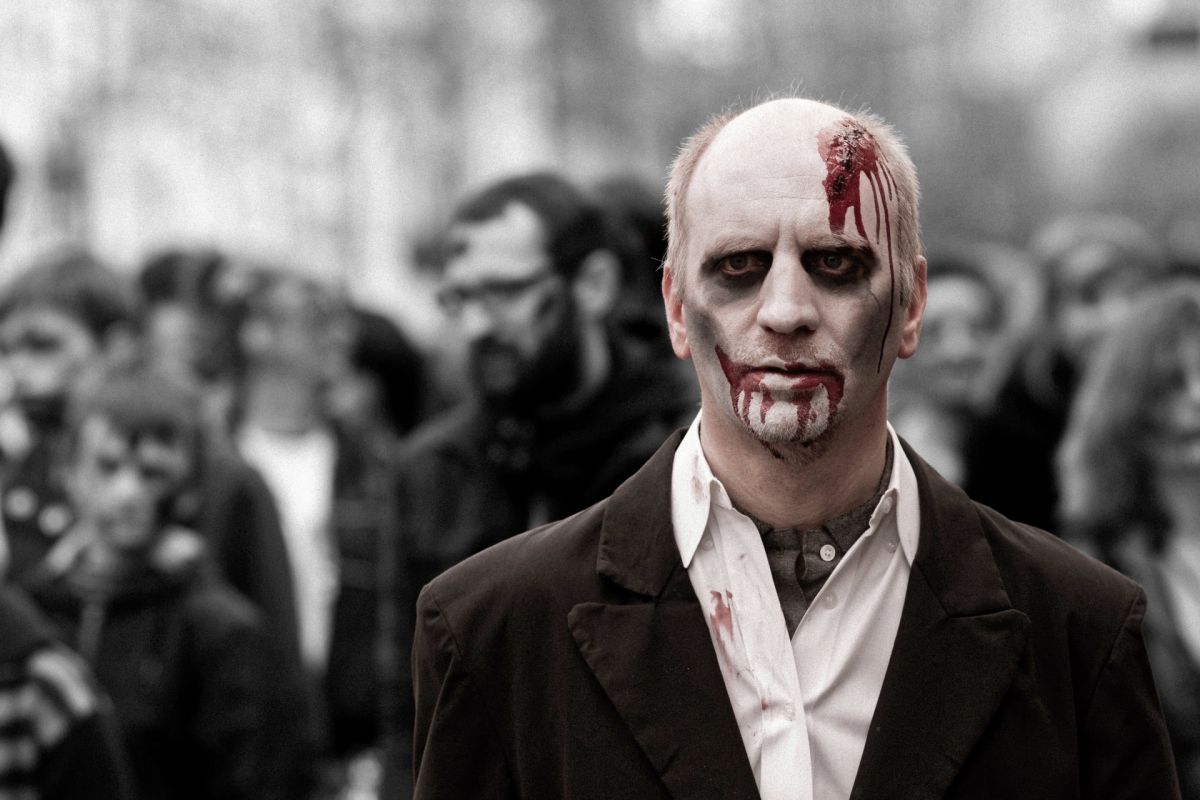Opinion: Netflix’s Reality Z is an apocalyptically bad reimagining of Charlie Brooker’s Dead Set
By Jay Darcy

Reality Z is a Brazilian Netflix series based on the acclaimed British series Dead Set, created by Charlie Brooker, the man behind Black Mirror. Brooker is credited as an executive producer on Reality Z, but I imagine this creative genius had little input, because Reality Z is apocalyptically bad.
Dead Set explores what happens to the Big Brother contestants and crew during a zombie apocalypse, with the cast trapped inside the house, unaware of the apocalypse. Parallels were drawn recently, with international Big Brother casts unaware of the coronavirus pandemic. Dead Set even starred Davina McCall, Big Brother’s host at the time — yes, that’s how old the show is. Watching zombie Davina hunting the show’s producer was both terrifying and hilarious.
Whilst Big Brother Brasil exists, Reality Z focuses on a fictional show called “Olympus”, where contestants play Greek Gods, and “Big Brother” is now Zeus. This helps allude to the way humans play God(s). The first five episodes are a straightforward remake of Dead Set. Having watched the whole five episodes of Dead Set the day before watching the first half of Reality Z, I was shocked that almost every scene in the remake is a direct copy of almost every scene in the original, with many lines simply translated into Brazilian Portuguese. Even the characters look extremely similar, with some exceptions, e.g. the British blonde bimbo becomes a dark-haired fiery Latina (of course).
Meanwhile, Davina becomes Divina, a B-list fame-hungry celebrity, played by television presenter Sabrina Sato, a former Big Brother Brasil contestant – nice touch. The two young male housemates swap roles in a couple of scenes, for unknown reasons. A timely change is swapping the gender-nonconforming gay male housemate for a trans woman. The biggest change, though, is the emission of Riz Ahmed’s character: the lead character’s boyfriend making his way to the house with a brave woman he runs into. In Reality Z, these two characters are replaced with a mother and son, the mother being the architect of Olympus.
Scrapping the boyfriend has small knock-on effects, but giving the lead character a new love-interest was silly – she falls in love with a guy she’s known for mere hours?! There is also a smaller storyline involving a politician trying to escape the city.
Whilst it is a straightforward remake, the gritty British dark comedy is transformed into a glossy Latin American drama that is neither scary nor funny. The characters are thoroughly unlikeable and annoying (they’re more likeable as zombies). Episode 5 of both shows ends with the entire cast and crew of Olympus dead or undead. Episode 6 is where ‘Reality Z’ gets interesting: the mother and son, the politician and his employee, two cops, and a criminal arrive at Olympus.
The show’s second half is sequel of sorts to Dead Set, exploring what might have come next by following these new characters reclaiming Olympus from the undead. They run into Olympus’ undead cast and crew, with some characters recognising the TV stars, but these characters are quickly killed off, resulting in a weird separation of the two halves of the show, similar to ‘American Horror Story: Roanoke’, which also explored a Big Brother-type show.
There were some missed opportunities. Reality Z could have explored the architect’s relationship with her former colleagues, which would have been especially interesting if they kept the show’s director alive. We never even find out why she was fired. The show had the chance to change the ending of Dead Set to make for something more interesting: if the lead character stayed in the locked room for a little longer, she would have been saved by the new “housemates”. The show’s architect runs into her, now undead, but she does not recognise her.
The remainder of the show was a bigger mess than the zombie apocalypse. Episode 8 opened with a dramatic, emotional scene and ended with a gripping cliff-hanger, but the middle of the episode was as poor as the rest of the show. This episode introduced split-screens, which would have been effective had they appeared continually and not two episodes before the finale. It seemed as though the editors were seven episodes in and had the bright idea to use split-screens to increase drama but could not be bothered to go back and edit the prior episodes.
The show effectively addresses political themes, including corruption, the Mafia, the monstrous nature of humans, and playing God. The latter is done effectively, with the politician taking on the role of “Zeus”, attempting to control the others. The show asks, “who are the real monsters?”. The demise of the characters in the final episode is not brought on by the zombies, per se, but the humans’ greed and bigotry. “Be more human than us,” one of the characters records herself saying, hoping other humans will arrive, take control of Olympus, and do better.
Unfortunately, Reality Z is an Olympic-sized mess, with two-dimensional characters, who die too soon and too often for us to care, and too much going on to focus on many of its promising themes and storylines, but most of them go nowhere anyway. Reality Z is another post-apocalypse show that nobody asked for and a remake of a show that was perfect as it was. If you’re thinking of watching it, just watch Dead Set instead.







